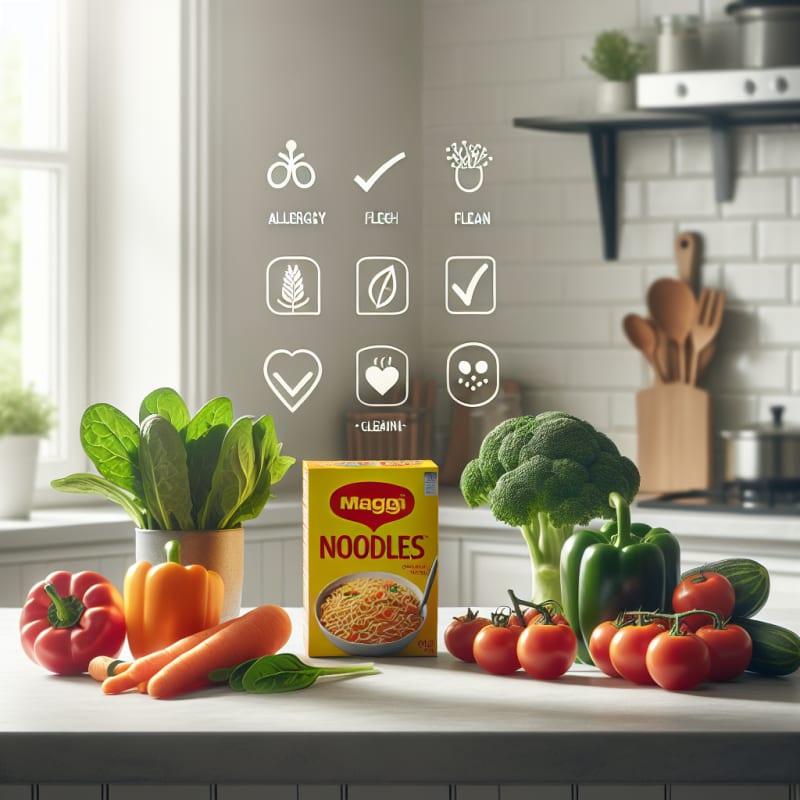Is Maggi Halal Or Kosher? A Global Ingredient Guide for Religious Diets
Category: Halal / Jain / Religious
Navigating food choices can be complex for those following religious dietary laws, especially with popular brands like Maggi. Whether you’re seeking halal or kosher certification, understanding the ingredients and regulations is essential. In this comprehensive guide, we answer the pressing question: Is Maggi halal or kosher? We examine Maggi’s ingredients, global labeling laws, scientific sources, and how technology—like the Food Scan Genius app—empowers consumers to make informed decisions.
Why Religious Dietary Laws Matter in Everyday Food Choices
For millions, religious dietary laws—such as halal (Islamic) and kosher (Jewish)—are not just preferences but essential practices. These laws affect everything from grocery shopping to dining out, making ingredient transparency vital. Foods like Maggi, a staple in many households, often raise questions about their compliance with these standards.
What Is Maggi? A Global Pantry Staple
Maggi is a brand owned by Nestlé, known worldwide for its instant noodles, sauces, and seasonings. Its popularity spans continents, making it a frequent topic in discussions about religious dietary compliance. But is Maggi halal or kosher? The answer depends on several factors, including the product variant, manufacturing location, and local certification.
Ingredient Analysis: Is Maggi Halal or Kosher?
| Ingredient | US Labeling | EU Labeling | Halal/Kosher Concerns |
|---|---|---|---|
| Wheat Flour | Listed | Listed | Generally Permissible |
| Palm Oil | Listed | Listed | Permissible if not contaminated |
| Flavor Enhancers (E621, MSG) | Listed as MSG | Listed as E621 | Check for animal origin |
| Hydrolyzed Protein | Source specified | Source specified | Must be plant-based for halal/kosher |
| Seasoning (may include onion, garlic, spices) | Listed | Listed | Check for hidden animal derivatives |
Ingredient transparency is crucial. According to the FDA in the United States and the EFSA in Europe, food products must clearly list all ingredients and additives. However, certain flavor enhancers or hydrolyzed proteins may be derived from animal sources, which can affect halal and kosher status.[1]
Halal Certification: Maggi’s Status Worldwide
- United States: Most Maggi products are not specifically halal certified. Ingredient lists must be checked for animal-derived additives.
- European Union: Some Maggi variants carry halal certification, especially in countries with significant Muslim populations (e.g., France, Germany). Always look for the official halal logo.
- Asia & Middle East: Many Maggi products in Malaysia, Indonesia, and the UAE are halal certified. Nestlé’s local websites provide certification details.
Key Point: Certification varies by country and product. Always check packaging for halal symbols and consult local authorities.
Kosher Certification: Maggi’s Status Worldwide
- United States: Some Maggi products—especially bouillon cubes and seasonings—are kosher certified. Look for symbols like OU or Kof-K.
- European Union: Kosher certification is less common but available in select markets.
- Israel: Maggi products sold locally often carry kosher certification from recognized authorities.
Key Point: Kosher status depends on both ingredients and manufacturing processes. Always verify with recognized kosher symbols and consult rabbinical authorities.
Scientific & Regulatory Perspectives
The FDA requires clear labeling of all ingredients, including potential allergens and additives. The EFSA provides similar regulations in Europe, emphasizing transparency for consumers.[1]
Recent studies published in PubMed highlight the importance of ingredient origin in processed foods, especially for those with religious dietary restrictions.[1]
News outlets like The New York Times and BBC News have reported on the global popularity of instant noodles and the evolving landscape of food labeling and religious certification.[2]
Global Comparison: US vs EU Labeling Laws
- United States: The FDA mandates ingredient disclosure but does not require halal or kosher labeling unless certified.
- European Union: The EFSA enforces strict ingredient transparency, and some countries require explicit halal/kosher labeling for certified products.
- Other Regions: Countries like Malaysia and Indonesia have robust halal certification bodies, while Israel has stringent kosher standards.
Implication: Always check local regulations and packaging for certification symbols. Ingredient lists may differ by region due to local laws and consumer demand.
Q&A: Is Maggi Halal or Kosher? Your Top Questions Answered
Q: Is Maggi halal?
A: Maggi’s halal status depends on the product variant and country of sale. In Muslim-majority countries, many Maggi products are halal certified. In the US and EU, check for halal symbols and review ingredient lists for animal-derived additives.
Q: Is Maggi kosher?
A: Some Maggi products are kosher certified, especially in the US and Israel. Look for recognized kosher certification symbols on packaging.
Q: How can I verify Maggi’s halal or kosher status?
A: Check packaging for certification logos, consult official Nestlé websites, and use apps like Food Scan Genius for instant verification.
Q: Are there hidden ingredients to watch for?
A: Yes. Flavor enhancers, hydrolyzed proteins, and certain seasonings may contain animal derivatives. Always read the full ingredient list and scan for additives.
How Food Scan Genius Empowers Religious Consumers
Technology is transforming how we make food choices. Food Scan Genius is an innovative app designed for people with dietary sensitivities or religious preferences. Simply scan the barcode of any product—like Maggi noodles—and instantly see if it meets halal, kosher, Jain, or other dietary standards.
- Instant ingredient analysis and religious certification status
- Geo-specific results based on local regulations
- Personalized alerts for hidden animal-derived additives
User Testimonial: “As someone who keeps halal, Food Scan Genius has made shopping so much easier. I can scan Maggi noodles and know right away if they’re suitable. Highly recommend!” — Fatima, Chicago
Download Food Scan Genius to simplify your food choices and ensure compliance with your dietary needs.
Summary Table: Maggi Halal/Kosher Status by Region
| Region | Halal Certified? | Kosher Certified? | Key Authority |
|---|---|---|---|
| United States | Some variants | Some variants | FDA, OU, Kof-K |
| European Union | Some variants | Limited | EFSA, local bodies |
| Malaysia/Indonesia | Most variants | Rare | JAKIM, MUI |
| Israel | Rare | Most variants | Israeli Rabbinate |
Best Practices: How to Shop for Halal or Kosher Foods
- Always check for official certification logos on packaging
- Read ingredient lists thoroughly, especially for flavor enhancers and proteins
- Use apps like Food Scan Genius for instant verification
- Consult local religious authorities if unsure
- Stay informed with news updates and regulatory changes
Conclusion: Making Informed Choices with Maggi and Beyond
The question “Is Maggi halal or kosher?” highlights the broader challenge of navigating food labels and religious dietary laws. Ingredient transparency, global certification standards, and technology like Food Scan Genius are empowering consumers worldwide. Whether you’re shopping in the US, EU, Asia, or Israel, understanding ingredients and leveraging smart tools ensures you can enjoy your favorite foods with confidence and peace of mind.
For anyone committed to religious dietary practices, the journey doesn’t end with Maggi. Stay informed, use technology, and consult trusted authorities to make every meal safe and satisfying.





